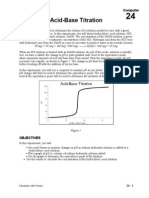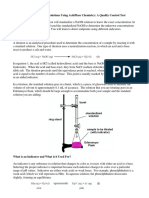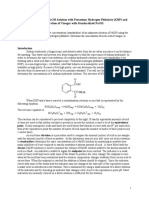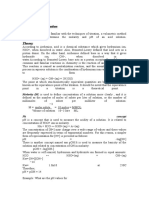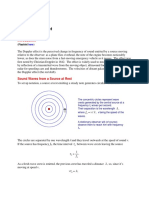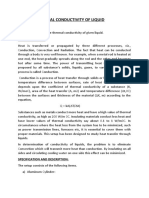0 ratings0% found this document useful (0 votes)
101 viewsS Y PH Meter
S Y PH Meter
Uploaded by
Neelam KapoorThis document outlines the procedure for standardizing a pH meter and performing an acid-base titration. Key steps include:
1) Calibrating the pH meter using buffer solutions of pH 4, 7, and 9.2.
2) Titrating an unknown concentration of HCl with 0.1M NaOH solution, recording the pH and volume added at each step.
3) Creating a graph of pH vs volume of NaOH and determining the endpoint volume, then using this value along with the concentrations to calculate the normality of HCl.
Copyright:
© All Rights Reserved
Available Formats
Download as DOCX, PDF, TXT or read online from Scribd
S Y PH Meter
S Y PH Meter
Uploaded by
Neelam Kapoor0 ratings0% found this document useful (0 votes)
101 views2 pagesThis document outlines the procedure for standardizing a pH meter and performing an acid-base titration. Key steps include:
1) Calibrating the pH meter using buffer solutions of pH 4, 7, and 9.2.
2) Titrating an unknown concentration of HCl with 0.1M NaOH solution, recording the pH and volume added at each step.
3) Creating a graph of pH vs volume of NaOH and determining the endpoint volume, then using this value along with the concentrations to calculate the normality of HCl.
Original Description:
ph meter experiment
Original Title
S Y ph meter
Copyright
© © All Rights Reserved
Available Formats
DOCX, PDF, TXT or read online from Scribd
Share this document
Did you find this document useful?
Is this content inappropriate?
This document outlines the procedure for standardizing a pH meter and performing an acid-base titration. Key steps include:
1) Calibrating the pH meter using buffer solutions of pH 4, 7, and 9.2.
2) Titrating an unknown concentration of HCl with 0.1M NaOH solution, recording the pH and volume added at each step.
3) Creating a graph of pH vs volume of NaOH and determining the endpoint volume, then using this value along with the concentrations to calculate the normality of HCl.
Copyright:
© All Rights Reserved
Available Formats
Download as DOCX, PDF, TXT or read online from Scribd
Download as docx, pdf, or txt
0 ratings0% found this document useful (0 votes)
101 views2 pagesS Y PH Meter
S Y PH Meter
Uploaded by
Neelam KapoorThis document outlines the procedure for standardizing a pH meter and performing an acid-base titration. Key steps include:
1) Calibrating the pH meter using buffer solutions of pH 4, 7, and 9.2.
2) Titrating an unknown concentration of HCl with 0.1M NaOH solution, recording the pH and volume added at each step.
3) Creating a graph of pH vs volume of NaOH and determining the endpoint volume, then using this value along with the concentrations to calculate the normality of HCl.
Copyright:
© All Rights Reserved
Available Formats
Download as DOCX, PDF, TXT or read online from Scribd
Download as docx, pdf, or txt
You are on page 1of 2
Aim : Standardization of pH meter & acid-base titration.
Apparatus: HCl (unknown conc.), 0.10 M NaOH, beaker,100-mL graduated
cylinder, buret, pipette ,pH meter and electrode , pH buffer solutions
(pH 4 ,7and 9.2)
Theory: Most of the chemical and biochemical processes are profoundly affected by
the acidity or alkalinity of the medium in which the reaction takes place. All acid
dissociate in aqueous solution to yield H+ ions. Some acids like HCl, H2SO4, HNO3
etc. are completely ionized in aqueous medium where as CH3COOH, HCOOH etc.
ionize to a small extent only. The former is known as strong and the later as weak
acid. pH of any solution is defined as (–log H+ ) and has values between 0–14. pH <
7 indicate acidic solution, pH > 7 indicate basic solution and pH = 7 means neutral
solution. The pH of a solution can be measured accurately with the help of a pH
meter.
Procedure:
1)Switch on the instrument and wait for 10–15 minutes so that machine gets warmed
up. Measure the temperature of the solution and set the temperature compensate
control accordingly.
2)Prepare the buffer solution by adding buffer tablets of pH = 4,7 and pH = 9.2 in 100
mL of water separately. Wash the electrode with distilled water. Then, dip the
electrode in the buffer solution (pH = 4) taken in a beaker, so that the electrode
immersed to the solution properly. Set the pH meter to pH 4 and then rinse the
electrode with distilled water to remove any excess solution.
3)Similarly standardize the pH meter using basic buffer solution pH =7and 9.2.
pH-metric Titration:
1) Clean the electrode with distilled water. Take 10 mL of HCl solution in a
100 mL beaker or conical and immerse the electrode in it. If neede add distilled water
so that electrode is immersed.
2) Set the burette with 0.1M NaOH solution. Note down the reading shown on the pH
meter.
3)Add NaOH solution drop wise from the burette (maximum 0.5 mL at a time), shake
the solution well and note the corresponding pH values.
4)Near the end point, volume of NaOH added should be as small as possible
because the acid is neutralized and there will a sharp increase in pH values.
5)Plot a graph between pH and volume of NaOH added and find out the volume of
NaOH required (V2 mL) for complete neutralization of HCl from the graph ie value
corresponding to pH 7. Then find out the normality of HCl (N1)
Observation and Calculation:
pH metric Titration Volume of HCl taken (V1)=…. (mL) . Normality of NaOH N2 =).1N
pH Volume of NaOH
N1 V1 = N2 V2
Result: The normality of the HCl is ________(N)
You might also like
- Determining The Dissociation Constant of A Weak Acid Using The SpectrophotometerDocument23 pagesDetermining The Dissociation Constant of A Weak Acid Using The SpectrophotometerLaila Faeizah100% (7)
- Acid-Base Titrations Curve Formal LabDocument9 pagesAcid-Base Titrations Curve Formal LabAshley StraubNo ratings yet
- Weak Acid Strong Base Titration LabDocument8 pagesWeak Acid Strong Base Titration Labapi-265089380100% (1)
- Report 2Document10 pagesReport 2Maria Anh Thư0% (1)
- Practical 4Document2 pagesPractical 4vimukthi gunasinghaNo ratings yet
- Sulfamic Acid Titration C12!5!10Document5 pagesSulfamic Acid Titration C12!5!10Anonymous 1gXoNDYcNo ratings yet
- Exp 1Document17 pagesExp 1Nor SyuhailaNo ratings yet
- Lab 11 Acids, Bases, PH, Hydrolysis, and BuffersDocument10 pagesLab 11 Acids, Bases, PH, Hydrolysis, and BuffersChing Wai Yong67% (3)
- Pharmaceutical Analysis AnalysisDocument17 pagesPharmaceutical Analysis Analysisjunaidniazi10% (2)
- Titration of A Poliprotic AcidDocument7 pagesTitration of A Poliprotic AcidRaduNo ratings yet
- Experiment 2Document8 pagesExperiment 2Alok VermaNo ratings yet
- Acid and Base Titrations Using A PH MeterDocument5 pagesAcid and Base Titrations Using A PH MeterJason Oliver ChanNo ratings yet
- 24 Acid-Base TitrationDocument5 pages24 Acid-Base Titrationgardarr11No ratings yet
- Experiment No 5Document8 pagesExperiment No 5PUBG - Epic BattlesNo ratings yet
- Experiment 3 - Stoichiometry and Acid-Base Titrations RevisedDocument6 pagesExperiment 3 - Stoichiometry and Acid-Base Titrations Revisedomaraltiti20No ratings yet
- Experiment Number 5Document16 pagesExperiment Number 5najjar119No ratings yet
- Exp 6 PH Metric TitrationDocument3 pagesExp 6 PH Metric TitrationDeep DaveNo ratings yet
- Tit RationDocument7 pagesTit RationgautamahujaNo ratings yet
- Acid - Base Lab 2016 BegleyDocument7 pagesAcid - Base Lab 2016 BegleyIsaac SnitkoffNo ratings yet
- Experiment 7: Titration of An Antacid: Objective: in This Experiment, You Will Standardize A Solution of Base Using TheDocument7 pagesExperiment 7: Titration of An Antacid: Objective: in This Experiment, You Will Standardize A Solution of Base Using TheDALITSO CHIKOYANo ratings yet
- Potentiometric Titration Ex17Document10 pagesPotentiometric Titration Ex17Tien HaminhNo ratings yet
- PDF PH TITRATIONDocument16 pagesPDF PH TITRATIONعبدالله هنيةNo ratings yet
- Experiment 1&2Document8 pagesExperiment 1&2Fatima AhmedNo ratings yet
- Lab 3: Introduction To Acids Base Chemistry Part A Experimental Determination of Acid Dissociation Constant, KaDocument10 pagesLab 3: Introduction To Acids Base Chemistry Part A Experimental Determination of Acid Dissociation Constant, Kaenock yegonNo ratings yet
- Lab 1Document17 pagesLab 1Kema Technowaka100% (1)
- Lab R.2 - Concentration of An Acid - Three WaysDocument6 pagesLab R.2 - Concentration of An Acid - Three WaysAdarsh Raj TiwariNo ratings yet
- AP Chemistry - Titration Curves of Strong and Weak Acids and BasesDocument5 pagesAP Chemistry - Titration Curves of Strong and Weak Acids and BasesJonathan Chen100% (2)
- Elvish Bhaiiii 2Document6 pagesElvish Bhaiiii 2mondalsatya4427No ratings yet
- Determination Acetic AcidDocument21 pagesDetermination Acetic Acidameyakem100% (1)
- Detection of Ions in Solutions Using Acid/Base Chemistry: A Quality Control TestDocument4 pagesDetection of Ions in Solutions Using Acid/Base Chemistry: A Quality Control TestRuchika Sood100% (1)
- Elvish BhaiDocument6 pagesElvish Bhaimondalsatya4427No ratings yet
- Pre-Lab 2Document4 pagesPre-Lab 2thuy duongNo ratings yet
- Chemistry Report - Titration of VinegarDocument7 pagesChemistry Report - Titration of VinegarSabestNo ratings yet
- CWV 24 COMP Acid - Base - Titration PDFDocument8 pagesCWV 24 COMP Acid - Base - Titration PDFTha KantanaNo ratings yet
- Chemistry Lab Report1Document22 pagesChemistry Lab Report1RoseAnne BellaNo ratings yet
- Determinate of The Concentration of Acetic Acid in VinegarDocument22 pagesDeterminate of The Concentration of Acetic Acid in VinegarSYahira HAzwaniNo ratings yet
- Quantitative Reactions and Titrations ExperimentDocument5 pagesQuantitative Reactions and Titrations ExperimentJeremy BarrettNo ratings yet
- Standardization of A Naoh Solution With Potassium Hydrogen Phthalate (KHP) and Titration of Vinegar With Standardized NaohDocument4 pagesStandardization of A Naoh Solution With Potassium Hydrogen Phthalate (KHP) and Titration of Vinegar With Standardized NaohSantino MusaNo ratings yet
- How To Measure The PHPZC Using The PH Drift MethodDocument2 pagesHow To Measure The PHPZC Using The PH Drift Methodpaola aldana100% (1)
- Lab 1 AcidityDocument8 pagesLab 1 AcidityEngr Arafat QubatiNo ratings yet
- Potentiometric Titration of Strong Acid With Strong Base: ExperimentDocument4 pagesPotentiometric Titration of Strong Acid With Strong Base: ExperimentBasheer AhammadNo ratings yet
- Lab Experiment 3 - PH TitrationDocument1 pageLab Experiment 3 - PH Titrationfive shadowsNo ratings yet
- Experiment 7Document4 pagesExperiment 7Vinitra PillaiNo ratings yet
- Determination of The Concentration of Acetic Acid in VinegarDocument20 pagesDetermination of The Concentration of Acetic Acid in VinegarAthirah Hanafi78% (9)
- Experi 3 Acid Base TitrationDocument4 pagesExperi 3 Acid Base TitrationOromay EliasNo ratings yet
- Determination of The Concentration of Acetic Acid in VinegarDocument16 pagesDetermination of The Concentration of Acetic Acid in VinegarFirdaus HaziqNo ratings yet
- Experiment - H2SO4 Titration With NaOHDocument5 pagesExperiment - H2SO4 Titration With NaOHfreeharshaNo ratings yet
- lab work 3Document13 pageslab work 3sido sidomerNo ratings yet
- AP Chemistry Investigation 4 - Judy, Paul, AnthonyDocument13 pagesAP Chemistry Investigation 4 - Judy, Paul, AnthonyAnthony HowerNo ratings yet
- Experiment PHDocument8 pagesExperiment PHMohamed MubarakNo ratings yet
- Lab Titration of VinegarDocument5 pagesLab Titration of Vinegardesree07No ratings yet
- TitrationDocument20 pagesTitrationrafiq84No ratings yet
- Determination of The Concentration of Acetic Acid in VinegarDocument24 pagesDetermination of The Concentration of Acetic Acid in VinegarNadia Kama69% (13)
- Lab ReportDocument8 pagesLab ReportNAEEM MALIKNo ratings yet
- Lab Format:: Lab 2: Determination of Carbonate/BicarbonateDocument5 pagesLab Format:: Lab 2: Determination of Carbonate/BicarbonateAnaya FatimaNo ratings yet
- CH142Exp5Titration PDFDocument7 pagesCH142Exp5Titration PDFSako RasheedNo ratings yet
- Determination of Concentration of Acetic Acid in VinegarDocument22 pagesDetermination of Concentration of Acetic Acid in VinegarFatin Izzati Hasnan100% (1)
- No 3Document12 pagesNo 3Punit Ratna ShakyaNo ratings yet
- Pre-Lab 2Document4 pagesPre-Lab 2thuy duongNo ratings yet
- Advanced Pharmaceutical analysisFrom EverandAdvanced Pharmaceutical analysisRating: 4.5 out of 5 stars4.5/5 (2)
- 5: Edser'S A' Pattern: Actual Setup: Https://Youtu - Be/Ruksrcv8Of0Document3 pages5: Edser'S A' Pattern: Actual Setup: Https://Youtu - Be/Ruksrcv8Of0Neelam KapoorNo ratings yet
- TY Probability QBDocument1 pageTY Probability QBNeelam KapoorNo ratings yet
- Post Experiment Questions:-: 1. What Is A Decoder?Document3 pagesPost Experiment Questions:-: 1. What Is A Decoder?Neelam KapoorNo ratings yet
- Report WheeboxDocument12 pagesReport WheeboxNeelam KapoorNo ratings yet
- Python BasicsDocument2 pagesPython BasicsNeelam KapoorNo ratings yet
- Microcontroller Chapter1Document13 pagesMicrocontroller Chapter1Neelam KapoorNo ratings yet
- TY Bistable MultiDocument1 pageTY Bistable MultiNeelam KapoorNo ratings yet
- TYBSc. Physics Applied Component Electronic Instrumentation 18 19Document20 pagesTYBSc. Physics Applied Component Electronic Instrumentation 18 19Neelam KapoorNo ratings yet
- S.Y. Resistance of A Galvanometer G by Shunting GR - IIDocument2 pagesS.Y. Resistance of A Galvanometer G by Shunting GR - IINeelam KapoorNo ratings yet
- Fy NuclearDocument28 pagesFy NuclearNeelam KapoorNo ratings yet
- FY Radio MCQDocument3 pagesFY Radio MCQNeelam KapoorNo ratings yet
- MCQ Div CurlDocument4 pagesMCQ Div CurlNeelam Kapoor100% (1)
- Diffraction Grating - Using LaserDocument2 pagesDiffraction Grating - Using LaserNeelam KapoorNo ratings yet
- Sy - Integral CalculusDocument12 pagesSy - Integral CalculusNeelam KapoorNo ratings yet
- F.Y.B.Sc. Semii/Ii/I Ac Bridge Circuits N.KapoorDocument6 pagesF.Y.B.Sc. Semii/Ii/I Ac Bridge Circuits N.KapoorNeelam KapoorNo ratings yet
- DopplerEffect PDFDocument5 pagesDopplerEffect PDFNeelam KapoorNo ratings yet
- LogicDocument24 pagesLogicNeelam KapoorNo ratings yet
- Example 14refrigerationDocument2 pagesExample 14refrigerationryan williamNo ratings yet
- Thermal Conductivity of LiquidDocument4 pagesThermal Conductivity of Liquidganivada neelakanteswararaoNo ratings yet
- Acid Number Vs PHDocument2 pagesAcid Number Vs PHrajeevup2004100% (2)
- Ch-13 Thermal Properties of Matter: Daily Practice Problem 01Document4 pagesCh-13 Thermal Properties of Matter: Daily Practice Problem 01shreyaNo ratings yet
- Physics 15 - Thermal Properties and Temperature - 2Document59 pagesPhysics 15 - Thermal Properties and Temperature - 2Hakim AbbasNo ratings yet
- Thermodynamics I Final Course PlanDocument2 pagesThermodynamics I Final Course PlanAkatew Haile MebrahtuNo ratings yet
- Evaporation TutorialDocument2 pagesEvaporation TutorialjayaprinaNo ratings yet
- ME4202501 Thermodynamics I, Fall Term 2015 Practice 12: 8.314 kJ/kmol-KDocument1 pageME4202501 Thermodynamics I, Fall Term 2015 Practice 12: 8.314 kJ/kmol-K黃羿傑No ratings yet
- Cooling Tower LabDocument33 pagesCooling Tower LabSiliziwe DipaNo ratings yet
- Homework VI Me204 Final Exam 2020Document8 pagesHomework VI Me204 Final Exam 2020isbusiirlerNo ratings yet
- Soal Uas Tek KoputasiDocument1 pageSoal Uas Tek KoputasiAdhe GedeNo ratings yet
- Me Acv 18 QPDocument30 pagesMe Acv 18 QPHarshit TejraNo ratings yet
- 1.TareaParticipacion 2do - ParcialDocument19 pages1.TareaParticipacion 2do - ParcialLeonardo EstradaNo ratings yet
- Ashrae-Psychart Eng N SI PDFDocument2 pagesAshrae-Psychart Eng N SI PDFJonaz CruzNo ratings yet
- HT PPTDocument10 pagesHT PPTNikhilNo ratings yet
- KP K P Ha Ha: Fin Effectiveness Is The Ratio of Fin Heat Transfer and The Heat Transfer Without The FinDocument2 pagesKP K P Ha Ha: Fin Effectiveness Is The Ratio of Fin Heat Transfer and The Heat Transfer Without The FinVishal SaxenaNo ratings yet
- Dispersion of Air Pollutants: Depends On Meteorological ConditionsDocument43 pagesDispersion of Air Pollutants: Depends On Meteorological ConditionsSamrat SalikineediNo ratings yet
- 050 - Meteorology - AnswersDocument96 pages050 - Meteorology - AnswersEASA ATPL Question Bank100% (1)
- Second Law of ThermodynamicsDocument33 pagesSecond Law of ThermodynamicsSInowritaNo ratings yet
- Thermodynamics 2 (TRDMIA2)Document24 pagesThermodynamics 2 (TRDMIA2)Njabulo MdlaloseNo ratings yet
- Physics 13 - Simple Kinetic Molecular Model of Matter - 2Document40 pagesPhysics 13 - Simple Kinetic Molecular Model of Matter - 2Hakim Abbas75% (4)
- Techniques For Approximating The International Temperature Scale of 1990Document5 pagesTechniques For Approximating The International Temperature Scale of 1990BachihcaNo ratings yet
- The University of The South Pacific: School of Engineering and PhysicsDocument4 pagesThe University of The South Pacific: School of Engineering and PhysicsSiddhant Vishal ChandNo ratings yet
- OEP TopicsDocument2 pagesOEP TopicsChemical Engg.No ratings yet
- Yr 11 Thermal Physics Test 2019-S CCGSDocument8 pagesYr 11 Thermal Physics Test 2019-S CCGSsrichardsNo ratings yet
- Enthalpy of NeutralizationDocument7 pagesEnthalpy of Neutralizationtrottier.kaitlynNo ratings yet
- Gen Chem Practice Problems Ch10, 18 & Buffers f08Document6 pagesGen Chem Practice Problems Ch10, 18 & Buffers f08Anonymous rFIshYyNo ratings yet
- Escanear 0001Document3 pagesEscanear 0001estereotipoNo ratings yet
- 4 EquilibriumDocument3 pages4 EquilibriumRinki GiriNo ratings yet












